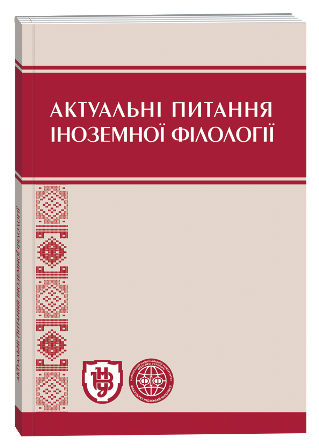FEATURES OF THE USE OF NEOLOGISMS IN THE MODERN FRENCH SOCIAL SPACE
DOI:
https://doi.org/10.32782/2410-0927-2023-19-9Keywords:
french, neologisms, social space, periodicals, public life, social interaction, lexical innovation, network society, communicative activity, scientific progress.Abstract
The article examines the issue of the peculiarities of the use of neologisms in the modern French social environment, since it represents one of the most productive sources of the lexical system of the language. The object of the study is neologisms in modern French, and the subject is the peculiarities of their functioning in social space. The concept of “neologism” is explored and different opinions of domestic and foreign authors on the research topic are presented. The features of the formation and use of new words in modern social conditions of French society are studied. The prospects for French society at the present stage are analyzed. A lot of materials from French periodicals and online publications, dictionaries, etc. were examined. The properties of the functioning of social neologisms and methods of their application are determined as a result of studying the sources used. The relevance of the study reflects the continuous process of the emergence, effectiveness and purpose of neologisms in modern French discourse due to socio-economic social innovations. Based on the materials studied, an analysis of the emergence, existence and use of neologisms within the social space was carried out. The material of the article indicates that thanks to the introduction of social innovations, the implementation of innovative activities, and the multi-vector development of all sociocultural spheres, the process of speech progress in public life is possible. In addition, the study showed that the formation of new words involves the generation of new connections in all areas of public life in different countries of the planet, which in turn affects the expansion of transnational interaction in the context of the development of a network society. A conclusion is made about the essence of the neologization process of the modern French language, including features, conditions, methods, paths, etc. Based on the fact that scientific, technological and technical processes are in a state of constant search, development and improvement, the prospect of further research is seen in the study of a certain sphere of socio-economic life and in the possible distribution of neologisms appearing in it into semantic groups.
References
Кагановська О. М., Філоненко Н. Г. Історія французької мови: Навчальний посібник. Київ : видавничий центр КНЛУ. 2003. 136 с.
Козубай І. В., Хаджи А. Ю. Дослідження структурно-семантичних особливостей новоутворень сучасної англійської мови. Вісник Луганського національного університету імені Тараса Шевченка: Філологічні науки, 2020. 3 (334). С. 19–26. Відновлено з http://visnyk.luguniv.edu.ua/index.php/vphil/article/view/282
Літературознавча енциклопедія: У двох томах. Т. 2 / Авт.-уклад. Ю. І. Ковалів. Київ : Видавничий центр «Академія», 2007. 624 с.
Остафійчук О. Д. Неологізми англійської мови в сучасному суспільстві. Вчені записки ТНУ імені В. І. Вернадського. Серія: Філологія. Соціальні комунікації, 2020. 31, 3 (1). 156-160. Відновлено з http://philol.vernadskyjournals.in.ua/journals/2020/3_2020/part_1/30.pdf
Тимощук І. О. Сучасний стан французької термінології. Вісник Рівненського Національного університету водного господарства та природокористування. Серія: Гуманітарні науки, 2010. 3 (51). С. 88–93. Відновлено https://ep3.nuwm.edu.ua/6741/1/V51_g_13%20%D0%B7%D0%B0%D1%85.pdf
Чередниченко О. І. Сучасна французька неологія з погляду перекладача. Вісник Київського національного університету імені Тараса Шевченка. Іноземна філологія. Київ : Київський національний університет імені Тараса Шевченка, 2009. Вип. 42. С. 8–9.
Canal Rêve. Retrieved from http://babelnet.sbg.ac.at/canalreve/regie/
Cavilamenligne. Retrieved from http://www.cavilamenligne.com/
Cflvet L.-J. Le versant linguistique de la mondialisation. Dialogues et cultures, 2001. 45 (1). Р. 80–87.
Charaudeau P., Maingueneau D. Dictionnaire d’Analyse du Discours. Paris: Seuil, 2002. 661 p.
Compte-rendu du Petit Larousse 2022. Dernière modification: 11.10.2021. Retrieved from https://orthogrenoble.net/mots-nouveaux-dictionnaires/entrees- petit-larousse-2022/
Dincă D. Typologie des emprunts lexicaux français en roumain. Fondements théoriques, dynamique et catégorisation sémantique. Revue de Linguistique Romane, 74. Strasbourg, Société de Linguistique Romane, 2010. Р. 589–604.
Gaudin F., Guespin L. Initiation à la lexicologie française: de la néologie aux dictionnaires. Bruxelles, De Boeck-Duculot, 2000. 355 р.
Le Grand Robert. Retrieved from https://www.lerobert.com/dictionnaires/francais/langue/dictionnaire-le-grandrobert-de-la-langue-francaise-edition-abonnes-3133099010289.html
Le Petit Robert. Retrieved from https://apps.apple.com/ua/app/dictionnaire-le-petit-robert/id458626631?l=uk
Le Petit Robert de la Langue Française et sa version numérique – 2024. Collectif. LE ROBERT. 2023. 2880 p. Retrieved from https://www.lerobert.com/dictionnaires/francais/langue/le-petit-robert-de-la-langue-francaise-2024-9782321018773.html
Moghaddam F. La crise sanitaire omniprésente dans les nouveaux mots du dictionnaire. Publié le 08.05.2021. Retrieved from https://www.franceculture.fr/sciences-du-langage/la-crise-sanitaire-omnipresente-dans-les-nouveauxmots-du-dictionnaire
Niklas-Salminen A. La lexicologie, 2e éd. Paris, Armand Colin. 2015. 224 p.
Pagava О. Modern process of neologization of the French language // Progressive research in the modern world. Proceedings of the 12th International scientific and practical conference. BoScience Publisher. Boston, USA. 2023.
Pp. 211–221. URL: https://sci-conf.com.ua/xii-mizhnarodna-naukovo-praktichna-konferentsiya-progressive-research-inthe-modern-world-17-19-08-2023-boston-ssha-arhiv/
Petit Larousse illustré 2022 : 170 nouveaux mots, «un bouleversement» pour ce professeur qui n39;a «jamais vu un tel changement linguistique». Publié le 04.05.2021. Retrieved from https://www.francetvinfo.fr/culture/petitlarousseillustre-
-170nouveaux-mots-un-bouleversement-pour-ce-professeur-qui-n-a-jamais-vu-un-tel changementlinguistique_
html
Sablayrolles J.-F. La néologie en Français Contemporain. Examen du concept et analyse de productions néologiques récentes. Paris: Honoré Champion Éditeur, 2000, 589 p.
Sablayrolles J.-F. «Néologie et dictionnaire(s) comme corpus d’exclusion», dans Sablayrolles, Jean-François (dir.), Néologie et terminologie dans les diction nnaires. Paris, H. Champion, 2008. Р. 19–36.
Sablayrolles J.-F. Extraction automatique et types de néologismes : une nécessaire clarification. Cahiers de Lexicologie, Centre National de la Recherche Scientifique, 2012. № 1 (100). 37–53. Retrieved from https://halshs.archives- ouvertes. fr/halshs-00721991/document
Tutora С., Navarro V. La Néologie et les neologisms. Création et repérage de mots nouveaux en langue française. Analyse pratique de reconnaissance de néologismes. Salamanca, 2015. 59 р. Retrieved from https://gredos.usal.es/bitstream/handle/10366/127972/TG_RevillaGarciaC_Neologismos.pdf;jsessionid=F614203B8F6339528DF62A4CF62A0AFD?sequence=1
TV5 Le Monde. Retrieved from https://www.bbc.com/afrique/monde- 64091505 – apprendre le francais avec TV5 MONDE.







